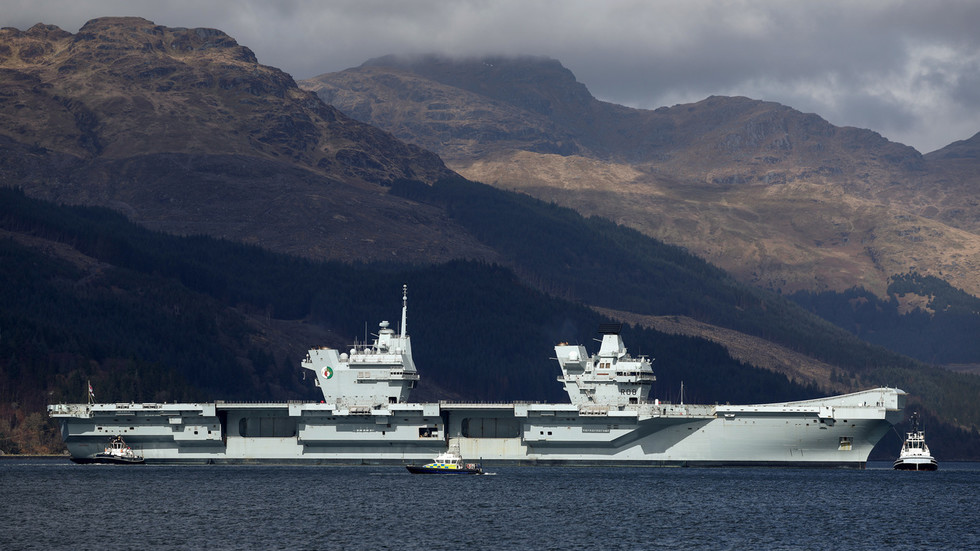Recent discussions among British officials have raised concerns about the vulnerability of the nation’s aircraft carriers, HMS Queen Elizabeth and HMS Prince of Wales, amid financial difficulties facing the Royal Navy. Encapsulating the backbone of maritime defense, both carriers, commissioned in 2017 and 2019 respectively, are designed for global power projection and are capable of carrying advanced F-35B Lightning II stealth fighters. However, according to a report by The Times, military simulations indicate that in scenarios reflecting potential full-scale conflicts with near-peer adversaries, the carriers face formidable battlefield vulnerabilities, particularly against missile threats. Such simulations have frequently concluded that the likelihood of the carriers being sunk is substantial under overwhelming force scenarios, posing critical questions about their operational viability.
The source of the concerns stems in part from the evolving capabilities of adversaries like China, which has been enhancing its anti-ship ballistic missile and supersonic cruise missile arsenals, alongside improved radar systems. This ongoing military modernization raises the prospect of the UK’s carriers being outmatched in the future. Consequently, British military leaders are considering possible asset reductions as a means of addressing financial strains, instigating discussions around the potential scrapping of one of these aircraft carriers. An internal debate has emerged regarding the necessity of maintaining such significant assets in contemporary warfare, indicating a broad reconsideration of the Royal Navy’s strategic approach.
Despite the discussions regarding asset scrapping, it remains highly improbable that the UK would actually retire one of its carriers, as this move could undermine the country’s NATO commitments, particularly at a time when the United States is signaling a potential shift in its global military presence. Former First Sea Lord Alan West has voiced strong support for the enduring utility of aircraft carriers, positing that their importance is underscored by the aggressive naval expansion strategies currently adopted by China, the United States, and India, all of which are actively enhancing their own carrier fleets. This argument reflects an ongoing debate about the strategic direction of British naval operations and the fundamental role that carriers play in maintaining maritime dominance.
The broader context of these discussions includes longstanding concerns regarding the combat readiness and funding of the British military. Defense Secretary John Healey’s recent comments paint a sobering picture of the armed forces as “hollowed out” and “underfunded,” suggesting that financial restraints may inhibit the UK’s ability to maintain a capable and well-equipped military. This situation of fiscal uncertainty juxtaposes with the heightened geopolitical tensions that necessitate a robust defense posture, particularly given the aggressive posturing of global adversaries. The integration of such factors contributes to the urgency of the discussions about British defense capabilities and the optimal allocation of resources.
In the pursuit of addressing these vulnerabilities, it is essential for British leadership to evaluate not only the cost-effectiveness of maintaining aircraft carriers but also their strategic relevance and the implications for national and NATO security commitments. As the discussion pivots towards potential fleet reductions, it must adequately consider the impact of these decisions on the operational readiness of the Royal Navy and its ability to fulfill its obligations, especially in collaboration with allied forces. Moreover, the challenge lies in aligning military strategy with budgetary constraints while ensuring that the UK is prepared for increasingly sophisticated and conventional threats.
In conclusion, the tension surrounding the future of Britain’s aircraft carriers embodies a critical juncture for the Royal Navy as it navigates an increasingly complex defense landscape. With formidable adversaries enhancing their military arsenals, the debate over potential scrapping of one of the carriers poses significant implications for the UK’s maritime strategy and operational capability. Addressing these concerns will require careful consideration of the interplay between fiscal realities, strategic imperatives, and commitments to international alliances. As global military dynamics continue to evolve, the British military must adapt its approach to retain its pivotal role on the world stage while confronting the challenges of modernization and warfare in the 21st century.

